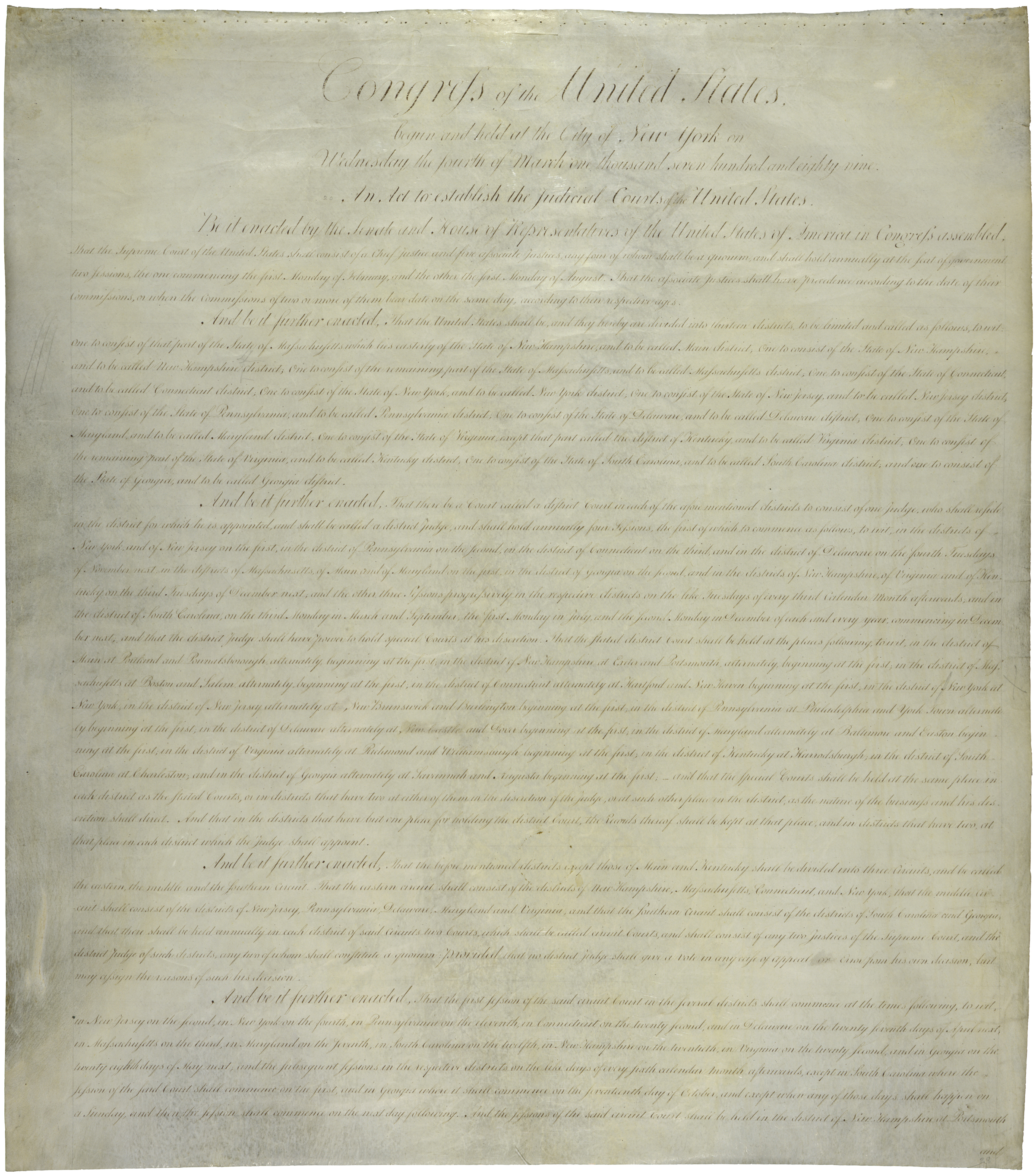
Date Created:
Year Created: 1789
Historical Theme:
Collection this Document is Affiliated with:
Description:
The Judiciary Act of 1789, officially titled "An Act to Establish the Judicial Courts of the United States," was signed into law by President George Washington on September 24, 1789. Article III of the Constitution established a Supreme Court, but left to Congress the authority to create lower federal courts as needed. Principally authored by Senator Oliver Ellsworth of Connecticut, the Judiciary Act of 1789 established the structure and jurisdiction of the federal court system and created the position of attorney general. Although amended throughout the years by Congress, the basic outline of the federal court system established by the First Congress remains largely intact today.
Section 1 of The Judiciary Act of 1789 act established the structure of the Supreme Court, appointing a chief justice with five associate justices, as well as sessions for the court to meet. Section 8 instituted an oath of office requirement for justices of the Supreme Court when they are sworn in. Section 13 gave the Supreme Court jurisdiction over certain civil cases and the power to issue writs of mandamus. A writ of mandamus is a court order used to require a government official or entity to perform a legal duty. It can also be used to order a lower court to rule on certain cases. It is to be used in extraordinary or important circumstances.
Categories of Documents:
SECTION 1. Be it enacted by the Senate and House of Representatives of the United States of America in Congress assembled, That the supreme court of the United States shall consist of a chief justice and five associate justices, any four of whom shall be a quorum, and shall hold annually at the seat of government two sessions, the one commencing the first Monday of February, and the other the first Monday of August. That the associate justices shall have precedence according to the date of their commissions, or when the commissions of two or more of them bear date on the same day, according to their respective ages.
SEC. 8. And be it further enacted, That the justices of the Supreme Court, and the district judges, before they proceed to execute the duties of their respective offices, shall take the following oath or affirmation, to wit: "I, A. B., do solemnly swear or affirm, that I will administer justice without respect to persons, and do equal right to the poor and to the rich, and that I will faithfully and impartially discharge and perform all the duties incumbent on me as , according to the best of my abilities and understanding, agreeably to the constitution, and laws of the United States. So help me God."
SEC. 13. And be it further enacted, That the Supreme Court shall have exclusive jurisdiction of all controversies of a civil nature, where a state is a party, except between a state and its citizens; and except also between a state and citizens of other states, or aliens, in which latter case it shall have original but not exclusive jurisdiction. And shall have exclusively all such jurisdiction of suits or proceedings against ambassadors, or other public ministers, or their domestics, or domestic servants, as a court of law can have or exercise consistently with the law of nations; and original, but not exclusive jurisdiction of all suits brought by ambassadors, or other public ministers, or in which a consul, or vice consul, shall be a party. And the trial of issues in fact in the Supreme Court, in all actions at law against citizens of the United States, shall be by jury. The Supreme Court shall also have appellate jurisdiction from the circuit courts and courts of the several states, in the cases herein after specially provided for; and shall have power to issue writs of prohibition to the district courts, when proceeding as courts of admiralty and maritime jurisdiction, and writs of mandamus, in cases warranted by the principles and usages of law, to any courts appointed, or persons holding office, under the authority of the United States.
Citation:
Avalon Project, Lillian Goldman Law Library, Yale University, New Haven, CT

